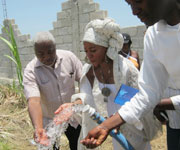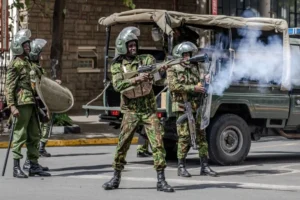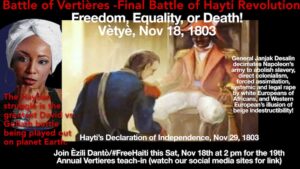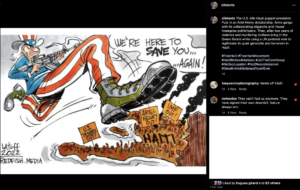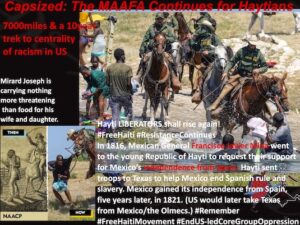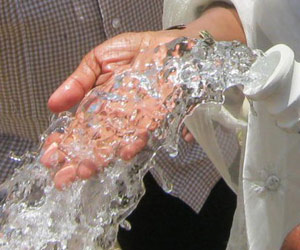HLLN honors and re-MEMBER Sonia Pierre, our new loss without measure. — Yon gwo mapou tonbe
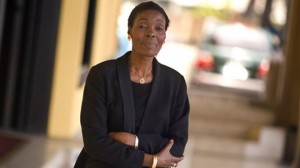 If you want to know what a hero is, what a saint looks like, what Go(o)d is. Then, re-MEMBER Sonia Pierre. Sing for our beloved Sonia.
If you want to know what a hero is, what a saint looks like, what Go(o)d is. Then, re-MEMBER Sonia Pierre. Sing for our beloved Sonia.

Sonia Pierre, our sister, a peerless warrior with boundless compassion for the vulnerable and stateless Haitian died Sunday, Dec. 4, 2011. Sonia Pierre was the executive director of Movement of Dominican-Haitian Women (MUDHA).
Born in a Batey in the Dominican Republic, our Sonia Pierre lived struggling for those left behind in the Bateys. She lived to stop the depravity, the misery, endless exploitation of the life of Haitian agricultural workers, cane cutters in the Bateys of the Dominican Republic. She used her life force to speak truth to power to the authorities in the DR who systematically abused and discriminated against Dominicans of Haitian descent.
Sonia first got arrested for protesting against the dehumanization of Haitians in the DR when she was 13-years old. And from that time until she died yesterday, she worked bravely, courageously to give hope to all Haitian-Dominicans. She created MUDHA and tirelessly fought to secure citizenship and education for Dominican-born ethnic Haitians and for more humane treatment of the most exploited of Haiti, especially DR children of Haitian descent. She died of a heart attack at the age of 48.
Two days before her death, the DR Supreme Court reversed her greatest gains for stateless Haitians in the DR. Confirming a decision to retroactively strip citizenship from Haitians, plausibly even that of Sonia Pierre. Why wouldn’t she have a heart attack? Sonia received a Robert F. Kennedy Human Rights Award to honoring this work for securing citizenship and education for Dominican-born ethnic Haitians. The DR Supreme Court’s reversal of the gains Sonia’s efforts made for stateless DR children of Haitian descent along with the constant death threats she faced and now deportation, surely added to cause her untimely and early death. (See – Dec. 7, 2011 Funeral of Sonia Pierre – Lakou New York Coverage (in Kreyol/ Broadcast December 9th, 2011) ; Videos –Stranded: Stateless in the Dominican Republic and Birthright Crisis.)
*************
Video – Birthright Crisis
Birthright Crisis from Haitian Women 4 Haitian Refugees on Vimeo.
*************
Born 48 years ago in the DR, Sonia bravely fought discrimination against poor Dominicans of Haitian descent since she was a child. She died because of us.
Sonia is survived by three children. She suffered endlessly before her death. Like Father Gerald Jean Juste, her work for Haitians who are constantly discriminated against was unceasing. No words can capture what she means, what she lifted up in a world filled with violence and inhumanity against stateless Haitians, stranded Haitians in the Dominican Republic.
Hear her last interview, on Oct. 12, 2001 on Lakou New York where Sonia explains the death threats against her, how the DR authorities threatened to arrest her children; how they pasted her picture all over the public transportation routes accusing her of harming tourism in the DR because she exposes the violence and exploitation against Haitian cane cutters in the Bateys and the official discrimination against Haitians born in the DR.
In another interview, an Oct. 3rd, 2011, Lakou New York, broadcasted with Sonia Pierre, we catch a glimpse of the injustices she faced every day. I send courage to all who loved and fought alongside Sonia. Condolences to her children and her colleagues at MUDHA. In that Oct 3rd interview, is reflected what Sonia Pierre stood against, how determined she was to never reconcile with injustice.
I spoke to Dahoud Andre, Haiti activist and host of Lakou New York Radio show today as we shared the pain of Sonia’s death. He explained that not too long ago, a nine year old Haitian girlchild in the DR was kidnapped by a 53 year old Dominican man. The child’s brother, who is 5 years old fought the kidnapper, vainly trying to stop the kidnap of the sister. But the neighbor took the nine year old girlchild home, brutally raped her and then bludgeoned her to death. The DR authorities found her clothes and blood in his house and arrested him. Soon, they released him after community pressure and went after the mother of the child instead for accusing the man of rape. Sonia Pierre was in the Lakou New York interview with the mother. She gave the victim’s mother sanctuary. She was hated by DR authorities and her life always under threat. Many good DR folks supported the humanity of Haitians but DR authorities systematically did not during most of Sonia’s life – from the moment she was born. For years, she was the only sanctuary in the DR for exploited Haitians. This lone Black woman, our courageous sister.
Sonia, you will be missed. We mourn your pain. That you died in such pain. That those who persecuted you so relentlessly actually are celebrating your death. We mourn that the little girl’s mother was the one the community of “decent” DR folks went after. You were the ones the DR authorities ostracized and not the tyranny against Haitians. You did more than a million others with more resources and spotlight. You stood tall my sister. We break, we splinter. But your courage keeps us alive. Your love remains our light. You join the line of warriors going back to the beginning of time and we know you will watch over us, those you left behind to face the unremitting cruelty Haitians living in the Dominican Republic and elsewhere face daily.
Rest in peace my sister. The rest is left to us. Ginen poze.
Ezili Dantò of HLLN
December 5, 2011
******************************
Background:
Dec. 7, 2011 Funeral of Sonia Pierre – Lakou New York Coverage (in Kreyol/ Broadcast December 9th, 2011)
Song – Yon Mapou Tonbe. WrittenbyJean-ClaudeMartineau/Koralen, sungby CaroleDemesmin
Lakounewyork Oct. 3, 2011 interview with Sonia Pierre
Stranded: Stateless in the Dominican Republic By Steve Sapienza
Dominicans of Haitian descent are struggling with government discrimination in the only country they have ever known.
********************************
SONIA PIERRE
Sonia Pierre leaves behind legacy of activism for Haitians in Dominican Republic
BY EDWIDGE DANTICAT
Source: Miami Herald
NOV. 17, 2006 FILE PHOTO: The Director of Dominican Women of Haitian Descent Sonia Pierre receives a kiss and the Robert F. Kennedy Human Rights Award from Kennedy’s widow Ethel Kennedy at the US Capitol in Washington, DC. MIKE THEILER / AFP/Getty Images
Ninaj Raoul, a human rights activist and executive director of the New York-based Haitian Women for Haitian Refugees, remembers meeting Sonia Pierre in 1994 at a conference decrying the agonizing plight of Haitian refugees.
On Wednesday, Raoul will watch as her mentor is buried in the Dominican Republic, where Pierre had been battling for the rights of Haitians and Dominican Haitians since Pierre was a teenager.
On December 4, 2011, Sonia Pierre died suddenly of a heart attack outside Villa Altagracia, where she was born to Haitian parents in an impoverished community of cane workers, on a batey. The 48 year old founder of MUDHA — Movimiento De Mujeres Dominico-Haitiana or Movement of Dominican Haitian Women — and the face and voice of thousands of Haitians and Dominican Haitians, Pierre leaves behind her mother, ten brothers and sisters, four children and three grandchildren, and those for whom she has been advocating since she was arrested, when she was 13, for organizing a five-day protest.
“Sonia, was a tremendous leader,” recalls Raoul. “Her human example and work for justice for so many are now a permanent legacy.”
Writer and educator Marie Lily Cerat, who sometimes acted as an English translator for her longtime friend, remembers a woman who spent days and nights dreaming a better world. “From the first day I met her,” says Cerat, “I was in awe of her humility and clarity about what each one could do to truly achieve an equitable world free of racism and inequalities. Her dedication and passion for human rights, women and girls” rights, and her deep compassion for others were unmatched in our generation.”
Filmmaker Amy Serrano, whose award-winning documentary, Sugar Babies, which I narrated, deals with the plight of stateless children who work as child laborers in Dominican cane fields, said upon learning of Sonia’s death: “Having spent considerable time with Sonia in Santo Domingo, Europe, and Canada on the issue of invisible children whose Haitian parents were trafficked to the Dominican Republic to serve powerful sugar interests, Sonia’s voice and presence was one of the very few that shone bright. Her words and legacy will live on.”
Miami resident Leonie Hermantin, deputy director of the Lambi Fund of Haiti, first met Sonia Pierre after hearing her speak several years ago at an International Women’s Day event in Miami.
“I was impressed by her demeanor,” remembers Hermantin, “her quiet yet intense determination to fight for the rights of our brothers and sisters.” The two met again recently, in Washington, where Pierre discussed, among other things, the victims of the Jan. 12, 2010, earthquake. Pierre’s organization, MUDHA, was one of the first on the ground in Haiti. Pierre and her colleagues fed, offered medical attention and nurtured local leaders in Léogâne, at the epicenter of the earthquake.
“Sonia Pierre impressed me yet again by her passion,” remembers Hermantin, “and her profound belief in the power of sisterhood. I also loved the way she reminded us that we share the hyphenated identity of a diaspora.”
Sonia’s passion for justice cost her a great deal. Because of her relentless pursuit of legal status for Haitians born in the Dominican Republic — the denial of which was upheld by the Dominican Supreme Court two days before she died — Pierre and her family often received death threats and she was at times physically assaulted. Though she was the recipient of awards from Amnesty International and the Robert F. Kennedy Center for Justice and Human Rights, she was commonly labeled Enemy No. 1 in her birthplace’s media outlets.
“I am not a critic of my country,” she often said in her own defense. “I am a critic of my government.”
Recently Pierre had been most vocal about the way tougher nationality measures have been used to de-nationalize or retroactively strip citizenship from Dominicans of Haitian descent, leaving even more of them and their children without access to birth certificates, travel documents, housing, education and healthcare, while making them targets for mass deportations. Pierre herself has been threatened with expulsion several times.
Her loss is one “without measure,” artist, activist and attorney Ezili Dantò, head of the Haitian Lawyers” Leadership Network, wrote to participants of an online list-serve soon after Pierre’s death. “Sonia Pierre lived struggling for those left behind in the batey. She lived to stop the depravity, the misery, endless exploitation of the life of Haitian agricultural workers, cane cutters. She used her life force to speak truth to power.”
“She envisioned a world where light and dignity would replace the deepest injustices perpetrated on the most vulnerable populations,” said Taïna Bien-Aimé, former executive director of the international human rights organization, Equality Now. “She amplified the voices of those no one could hear and that governments crushed into silence. Sonia could not tolerate the silence in the midst of such unattended suffering. Her fierce leadership, her dedication to protecting the human rights of women and her visionary tenacity will leave a hole in our stratosphere.”
“We lost a gentle giant,” said Marleine Bastien, founder of Haitian Women of Miami. “Her struggle was not only for the people in the bateys. She repeated this often. It was for all the world’s disenfranchised.”
“To be a woman, to be a mother, to defend human rights is hard,” Sonia Pierre said on October 25, 2011, at a U.S. Institute of Peace panel, after telling the story of a young Dominican Haitian girl whose rapist and killer only paid a 500 pesos fine before he was released, because, based on the girl’s legal status, a judge deemed her unworthy of a proper ruling.
Sadly, Sonia’s work remains undone. It is as if our fiercest warrior had left us on one of the steepest hills of the battlefield. And it is not only Sonia’s heart or the Dominican government that has failed her. Haitians and Dominican Haitians in the DR have had few vocal backers among powerbrokers and policymakers in Haiti, who could certainly do more, including leverage the fact that Haiti is among the top three importers of Dominican goods — half a billion dollars” worth — or that Dominican contractors are already benefiting from post earthquake construction in Haiti, to follow in Sonia’s footsteps and push for reforms.
Among the many things that Sonia Pierre taught us, with her life’s work and advocacy, is that we are never powerless. Nou pa pitimi san gadò, as the Haitian saying goes. And that, along with her innumerable other contributions, we will never forget.
Edwidge Danticat, winner of a 2009 MacArthur Foundation fellowship, is an award-winning novelist who lives in Miami.
*******
Sonia Pierre remembered
Sonia Pierre, tireless fighter for the human rights of Dominicans of Haitian descent, will be buried today at Lechería, the humble migrant camp near Santo Domingo in the Dominican Republic where she was born.
Pierre was only 48 when she suffered a fatal heart attack on Sunday, but her brave struggle for human rights could fill volumes.
“People are devastated, in shock, Sonia was one of a kind, it’s hard to believe she won”t be with us any more,” said Batala Aristide from Santo Domingo, a Brooklyn-born 18-year old who for two months has stayed at Pierre’s home while learning Spanish. “I was at the funeral home earlier today and it was crowded with all kinds of people painfully paying their respects.”
Pierre felt very early the pain of racial discrimination. She was arrested for the first time at 13 for organizing a march of Dominicans of Haitian descent for the rights of cane cutters.
She was threatened with deportation despite having been born in the Dominican Republic. From that moment on she dedicated her life to fight for the birthrights of her fellow Dominicans of Haitian descent.
“Today [Sunday], the Dominican Republic lost a great hero,” said Councilman Ydanis RodrÃguez (D-Washington Heights).
“Moving from humble origins to running the Movement for Dominican Women of Haitian Descent [MUDHA],” RodrÃguez added, “Sonia’s name became synonymous with progressive political change in the Dominican Republic, and so it’s difficult to overstate the impact she had on the lives of over 650,000 Dominicans of Haitian origin.”
Linked by geography and destiny, Haiti and the Dominican Republic share the island of Hispaniola and have similar histories of tyrannical governments and foreign invasions. Yet, they are deeply divided by a gulf of historical resentment and prejudice. Even today, Haiti’s occupation of Santo Domingo in the 19th century is still a source of mistrust.
“Haitian children born in the Dominican Republic are routinely denied birth rights,” said Ninaj Raoul, executive director for Haitian Women for Haitian Refugees, a Brooklyn-based nonprofit organization. “This violates the Dominican constitution.”
Redressing this injustice was the thrust of Pierre’s lifelong struggle. Last year in Washington, First Lady Michelle Obama and Secretary of State Clinton joined in presenting Pierre the International Women of Courage Award.
Add a comment:
Powered by Facebook Comments



